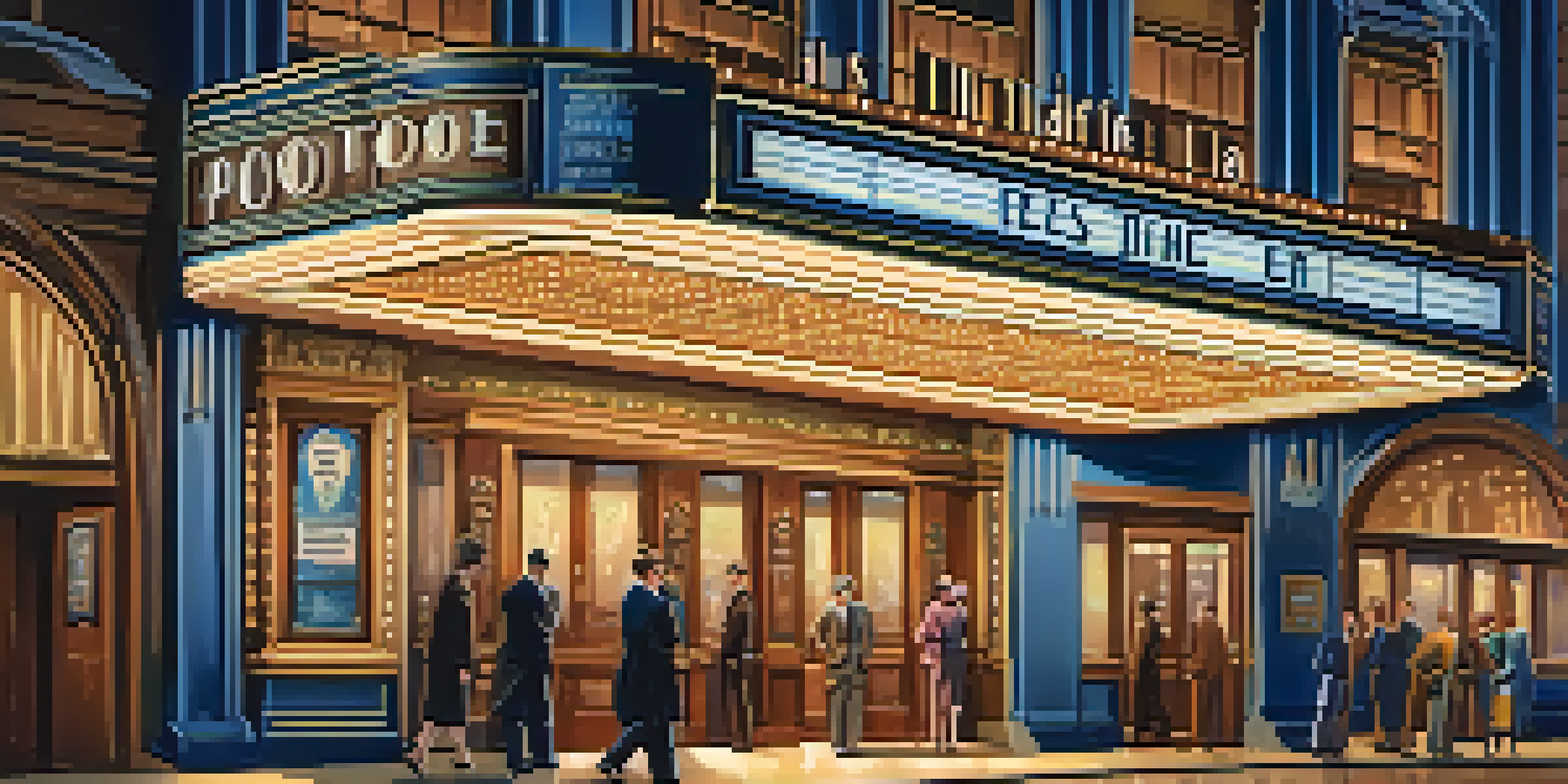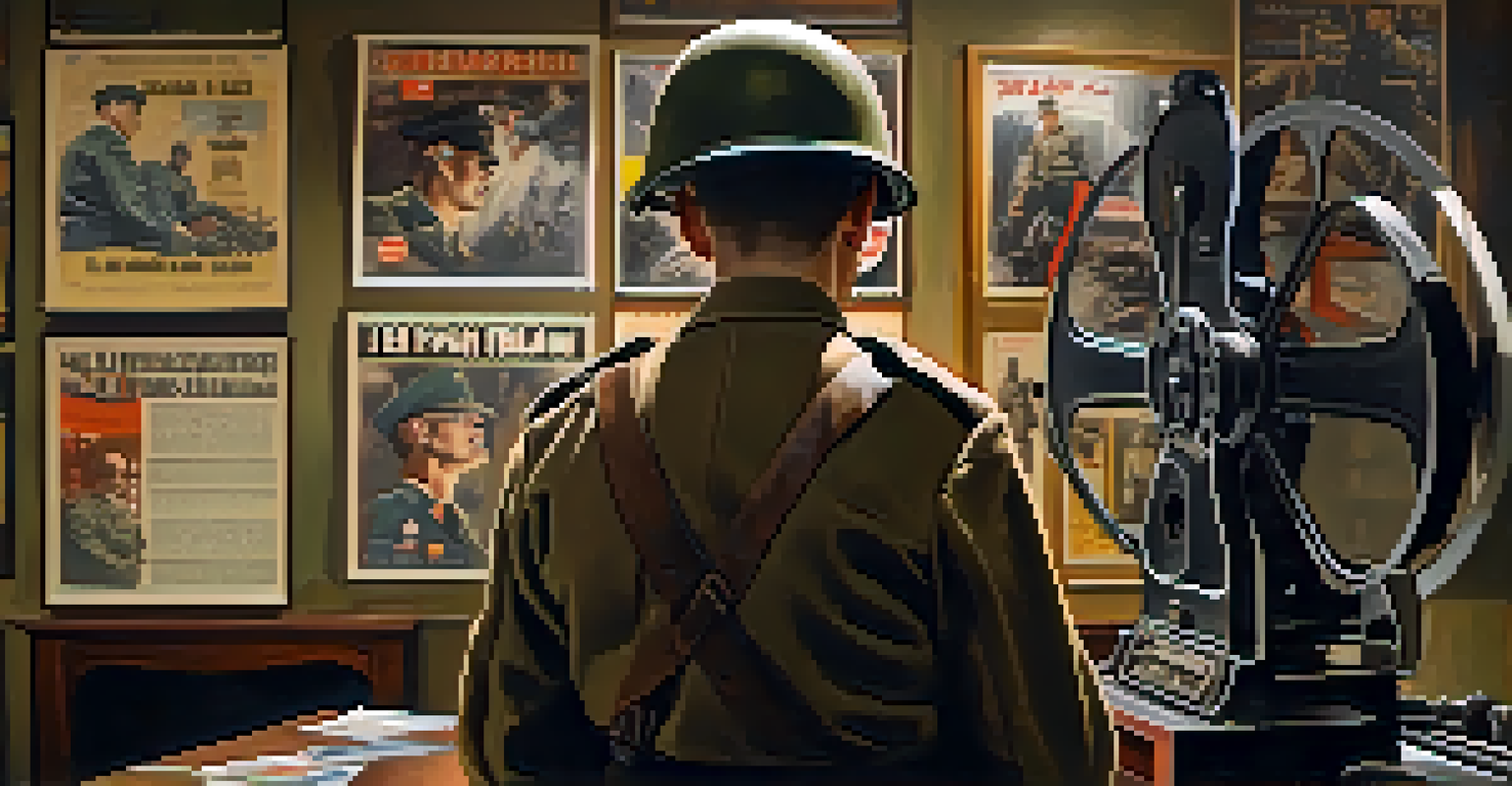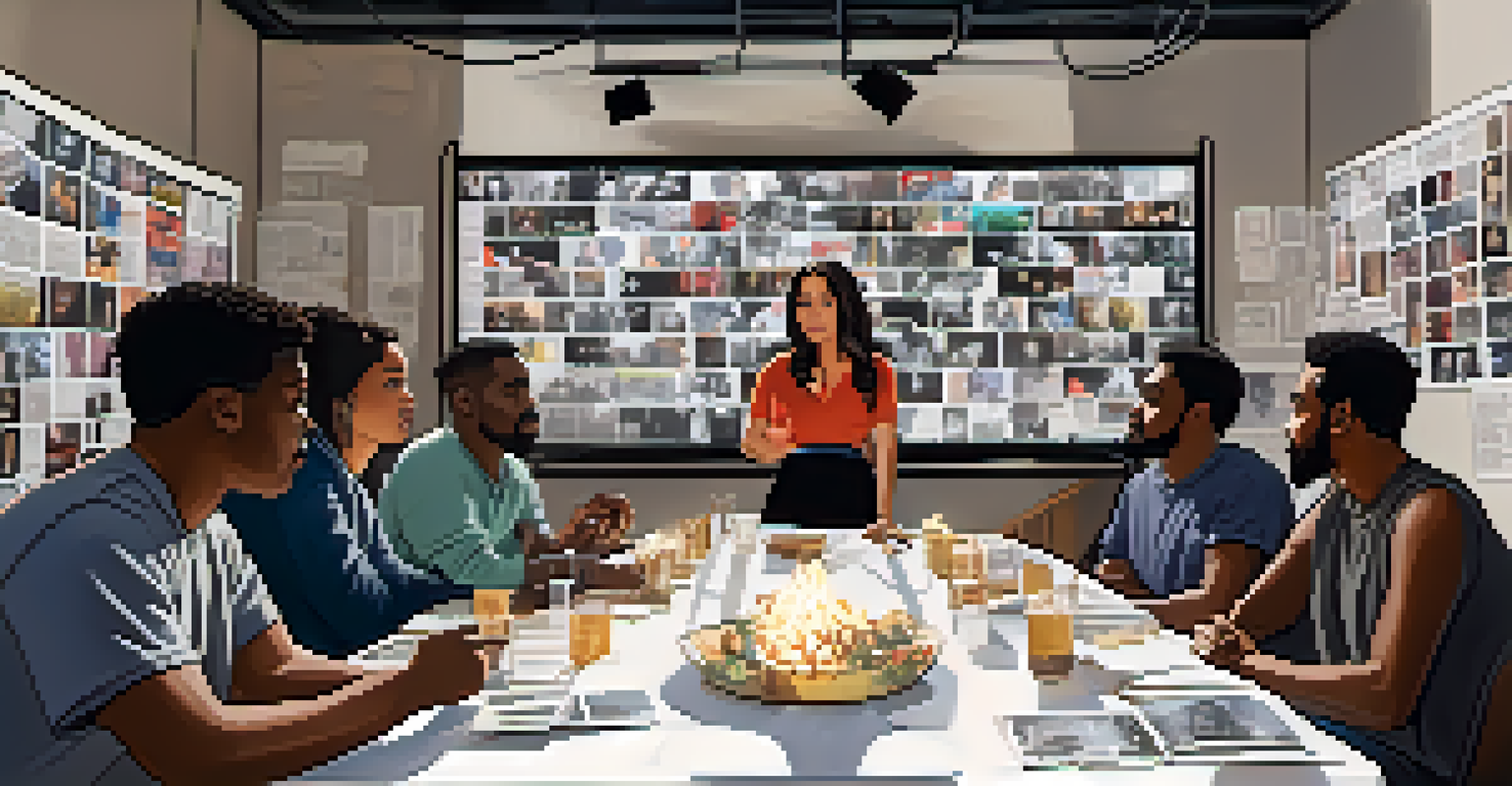Political Messaging in Hollywood: A Historical Overview

The Birth of Political Messaging in Early Cinema
In the early days of cinema, films were primarily a source of entertainment, but it didn't take long for political themes to emerge. Movies like 'The Birth of a Nation' (1915) showcased how film could be used to influence public opinion and propagate ideologies. This marked the beginning of a complex relationship between politics and Hollywood, where filmmakers began to recognize the power of the medium.
Cinema is a matter of what's in the frame and what's out.
As the world faced significant events such as World War I and the Great Depression, filmmakers started to reflect societal issues in their works. Films became a canvas for discussing war, poverty, and social justice, as seen in classics like 'Modern Times' (1936) by Charlie Chaplin. This shift illustrated how the industry began to embrace its role as a commentator on contemporary issues.
The early integration of political messaging set the stage for future generations of filmmakers. It highlighted the potential of cinema not just to entertain but to educate and provoke thought, paving the way for more explicit political narratives in the decades to come.
World War II and Propaganda Films
During World War II, Hollywood took on a more direct role in shaping public perception through propaganda films. The U.S. government collaborated with studios to produce films that promoted patriotism and encouraged enlistment. Movies like 'Why We Fight' served to educate soldiers and the public about the reasons for the war, blending entertainment with a strong political message.

Propaganda films often exaggerated the enemy's portrayal, showcasing the necessity of the war effort while rallying national pride. This period illustrated how Hollywood could mobilize public sentiment and influence collective attitudes toward critical global events. The films served both as entertainment and as tools for national unity.
Political Messaging Evolved in Film
From early cinema to modern blockbusters, filmmakers have increasingly used their art to address and reflect societal and political issues.
As the war concluded, the impact of these propaganda efforts echoed throughout Hollywood, influencing how filmmakers approached political issues in their narratives. The lessons learned from this era informed future filmmakers about the delicate balance between storytelling and messaging.
The Rise of Counterculture in the 1960s
The 1960s marked a significant turning point in Hollywood's approach to political messaging, as counterculture movements began to emerge. Filmmakers like Arthur Penn and Dennis Hopper produced movies that challenged authority and reflected the tumultuous social climate. Films such as 'Bonnie and Clyde' (1967) captured the spirit of rebellion against traditional values.
The medium is the message.
This era saw Hollywood embracing more controversial themes, including civil rights, anti-war sentiments, and the questioning of government authority. The film industry became a platform for voices that were often marginalized, allowing for a richer narrative landscape. The portrayal of these issues sparked conversations that resonated with audiences across the nation.
The 1960s established a precedent for the fusion of art and activism within Hollywood. Filmmakers recognized their potential to influence societal change, leading to a legacy of politically charged storytelling that would continue to evolve in the coming decades.
The 1970s: Political Thrillers and Social Commentary
The 1970s is often regarded as the golden age of political thrillers in Hollywood, with films like 'All the President's Men' (1976) shining a light on corruption and the dark underbelly of politics. These films not only entertained but also informed the public about real-life events, showcasing the power of journalism and the importance of holding leaders accountable.
The decade also produced socially conscious films that tackled issues such as poverty, race relations, and the Vietnam War. Movies like 'One Flew Over the Cuckoo's Nest' (1975) and 'The French Connection' (1971) reflected the growing disillusionment with authority and social systems. This era proved that Hollywood could delve into complex narratives while maintaining commercial viability.
Hollywood's Role in Propaganda
During significant historical events, such as World War II, Hollywood collaborated with governments to create propaganda films that shaped public perception and national unity.
As political tensions continued to simmer, the themes introduced in the 1970s laid the groundwork for future cinematic explorations. The blend of entertainment and political critique became a hallmark of many films, influencing how stories were told and received by audiences.
The 1980s and the Rise of Blockbuster Politics
In the 1980s, the film industry saw the emergence of blockbuster movies, which often incorporated political themes into their narratives. Films like 'Rambo: First Blood Part II' (1985) and 'Red Dawn' (1984) tapped into the Cold War anxieties and showcased a nationalistic fervor that resonated with audiences. These films often framed political issues within the context of action and heroism.
Hollywood's approach during this time reflected the broader cultural shifts, as the Reagan administration promoted a vision of American exceptionalism. Blockbuster films became vehicles for disseminating political ideologies, blurring the lines between entertainment and advocacy. This era demonstrated how commercial success could coincide with political messaging.
As audiences flocked to theaters, the influence of these blockbusters solidified Hollywood's role in shaping public discourse. The 1980s taught filmmakers that political narratives could thrive within mainstream cinema, paving the way for future political blockbusters.
The 1990s: Diverse Voices and Emerging Issues
The 1990s witnessed an explosion of diverse voices in Hollywood, leading to a broader representation of political issues. Filmmakers like Spike Lee and Ang Lee brought forward narratives that addressed race, identity, and the immigrant experience. Movies such as 'Do the Right Thing' (1989) and 'The Joy Luck Club' (1993) exemplified this shift toward inclusivity in storytelling.
This decade also saw the rise of independent films that tackled pressing social issues, such as gun violence and the AIDS crisis. Documentaries like 'Paris is Burning' (1990) and 'The Thin Blue Line' (1988) challenged mainstream narratives and provided a platform for marginalized communities. These films emphasized the necessity of diverse perspectives in political discourse.
Diverse Voices Reshape Narratives
The 1990s and beyond have seen a surge in diverse filmmakers, leading to richer storytelling that addresses a variety of political and social issues.
The 1990s set the stage for a more multifaceted approach to political messaging in Hollywood. Filmmakers increasingly understood the importance of representation, which ultimately enriched the cinematic landscape and sparked important conversations about societal change.
The 21st Century: Politics and Social Media
As we transitioned into the 21st century, the rise of social media transformed how political messaging is conveyed in Hollywood. Films began to engage with real-time political events, creating a dialogue with audiences that extended beyond the theater. This shift allowed filmmakers to respond to current events and societal issues almost instantaneously.
Movies like 'The Social Network' (2010) explored the complexities of technology and its impact on society, while others like 'Get Out' (2017) used horror to address racial tensions. The ability to share and discuss films on platforms like Twitter and Instagram has amplified their reach, fostering a new generation of politically engaged viewers.

This evolution has encouraged filmmakers to be more bold and innovative in their storytelling. The interplay between film and social media continues to reshape how political narratives are constructed, making Hollywood an essential player in contemporary political discourse.
Looking Ahead: The Future of Political Messaging in Hollywood
As we look to the future, the role of political messaging in Hollywood is more crucial than ever. With rising global issues such as climate change and social justice, filmmakers have a unique opportunity to influence public perception and inspire action. The evolution of technology and storytelling techniques will likely shape how these narratives are crafted.
Moreover, the increasing demand for authenticity and representation in Hollywood suggests that diverse voices will continue to thrive. As filmmakers from different backgrounds share their stories, we can expect a richer tapestry of political narratives that resonate with a broader audience. This shift will further solidify Hollywood's role as a platform for social and political change.
Ultimately, the future of political messaging in Hollywood is interconnected with the cultural zeitgeist. As societal values evolve, so too will the stories being told, ensuring that cinema remains a dynamic and powerful medium for political discourse.